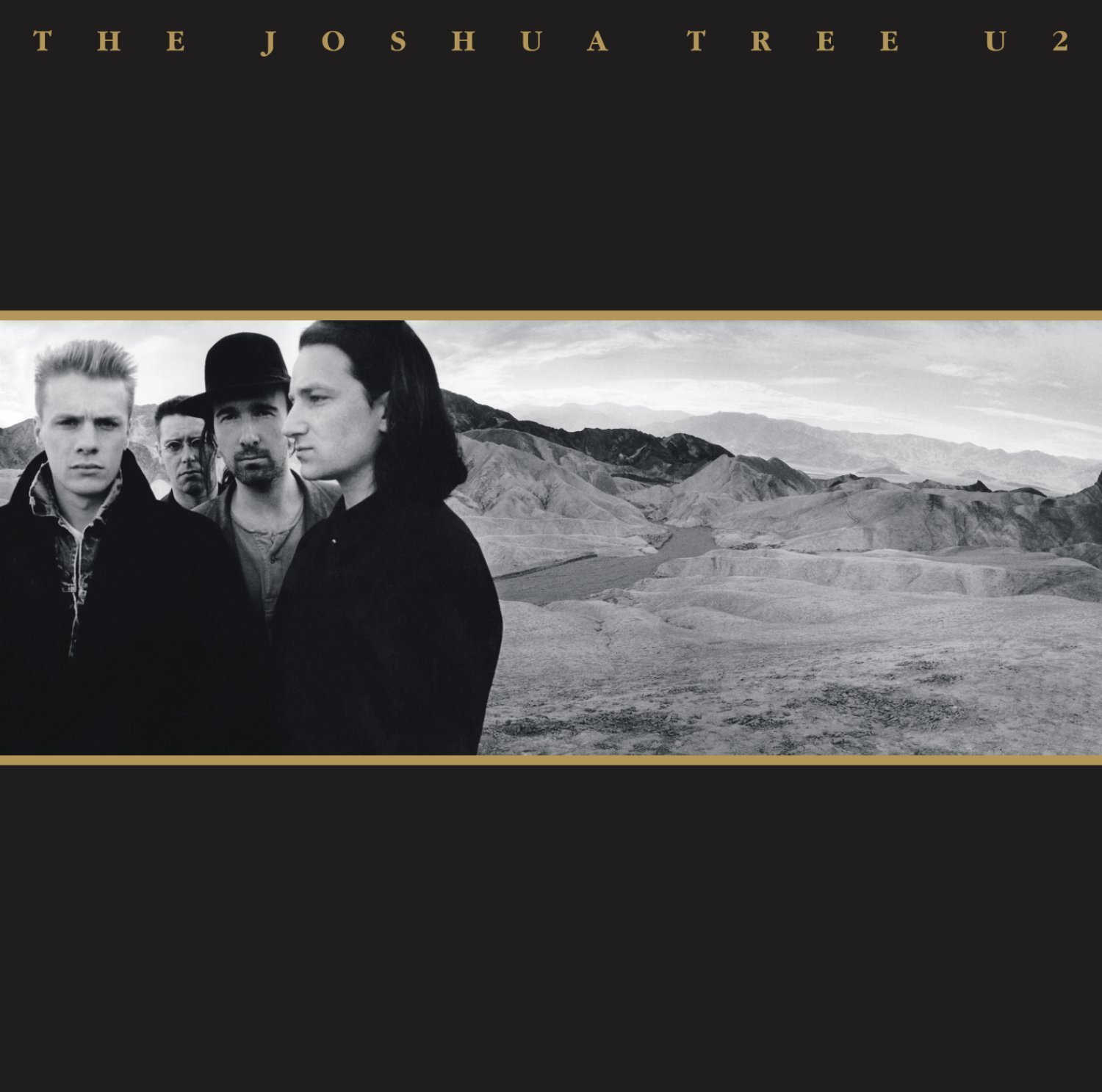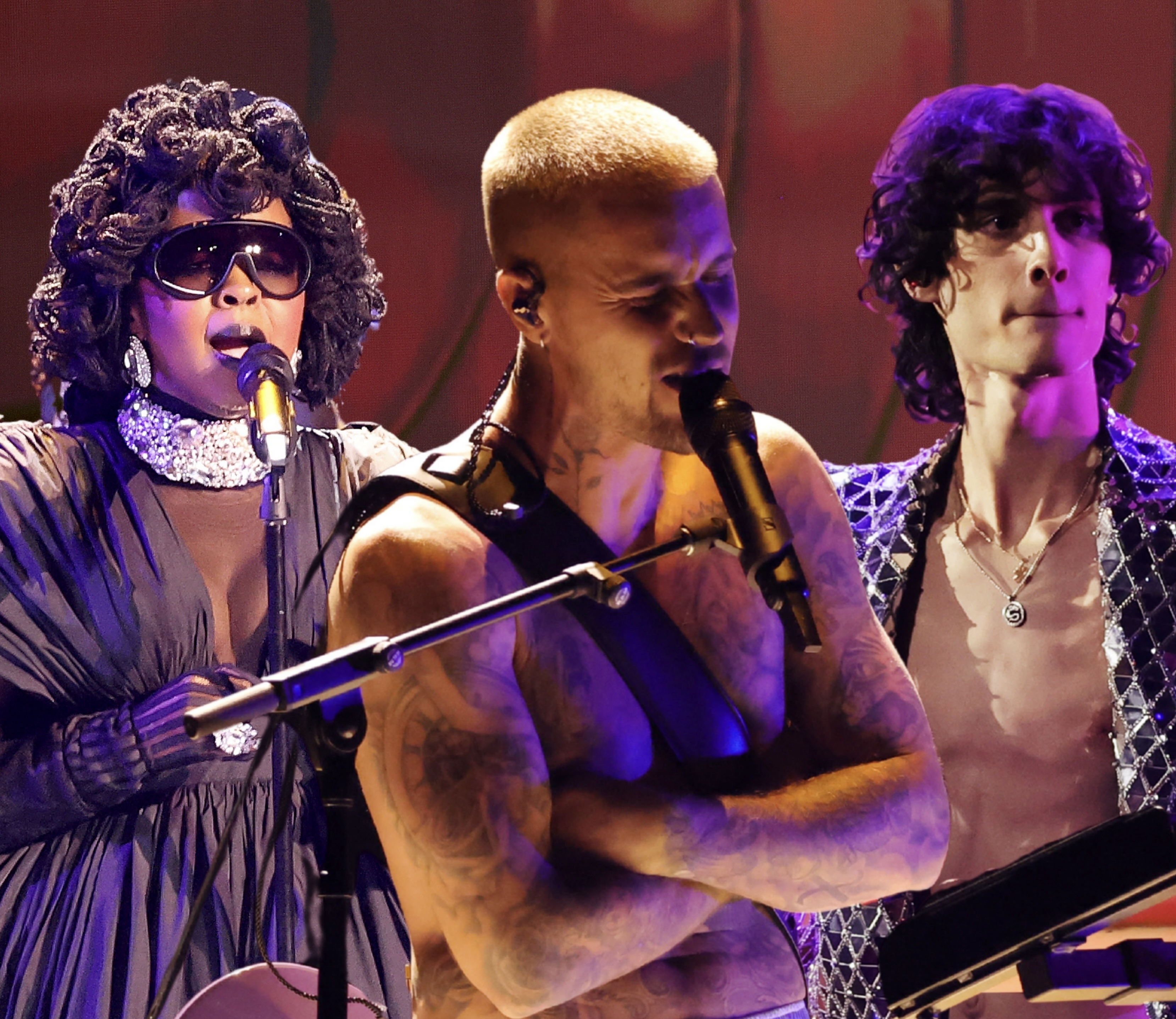The Joshua Tree was the first time that U2 had truly looked outward, across the world. The four men -- always the four of them, through the decades, Bono and the Edge and Adam Clayton and Larry Mullen, Jr. -- had started as post-punks in Dublin, writing about what they could see around them in Ireland. They had met up with Brian Eno and dabbled in traditions and textures from across Europe for 1984's The Unforgettable Fire. But as the '80s progressed, they saw other landscapes. They toured, they encountered the America they had heard so much about; Bono had made trips to Africa and South America that permanently altered his perspective, as well as his concerns as a person and a musician.
It's the first time U2 truly became U2 as we'd come to understand them -- developing the ability to look at faraway places and people and funnel their experiences into panoramic music, stuff that had specificity in its foundation but broadened into universal themes. As the years passed, this aim would also hamstring U2, their desire to continue being everything to everybody eventually resulting in vagueness and creative paralysis. But on The Joshua Tree, it worked gloriously, resulting in one of the greatest rock albums of all time.
The Joshua Tree turns 30 today. Back in January, U2 announced an accompanying stadium tour marking the album's anniversary, with the band playing the whole thing each night. (Were it not for the fact that The Joshua Tree begins with three of U2's most famous songs, playing it in sequence would be the obvious route here, though it remains unclear whether this will actually be the plan.) Naturally, such a move reeks of nostalgia cash-in, the sort that plenty of classic-rock bands have settled into after years of greatest hits sets, the sort that has prompted a seemingly unending series of younger artists to embark on full-album tours in recent years. Long a band obsessed with maintaining relevance and not repeating themselves artistically, it also marks a moment when they just might be accepting their role as elder statesmen.
Of course, the members of U2 could never bring themselves to just come out and say it that way. "Our most well-known and celebrated album is turning 30, so we're revisiting it," aren't words that mix well with the otherwise grand visions incubated behind Bono's ever-present sunglasses. Instead, the band has focused on the fact that Trump's election reoriented their thinking. Their already semi-long-gestating Songs Of Experience needed a minute so they could figure out whether it was really what they wanted to put out into this new, unexpected world, and it struck them that -- hey, coincidence -- just as The Joshua Tree was hitting 30, the world had come back around to a place not dissimilar to a late Cold War order of Reagan and Thatcher ruling the West. "I don't think any of our work has ever come full circle to that extent," the Edge told Rolling Stone in January when parsing the renewed resonance and meaning he and the other band members were seeing in the Joshua Tree material.
When U2 turned their eyes outward with The Joshua Tree, they specifically looked to America -- to the roots music of that country, the distant roots of the music U2 played, to the mythological iconography of the nation that defined the 20th century, the one that they, as four kids in Ireland, had regarded from across the ocean with some kind of awe. As Edge said in that same Rolling Stone interview:
So we looked at American [music]. We looked at the blues. We looked at the New Journalism. I remember that myself and Bono were reading Flannery O'Connor, the Southern writers. It was a conscious effort to look across the Atlantic and to start to explore America. I mean, for someone from Ireland, it is a vast source of ideas and aspirations and inspirations and generations, America being the Promised Land. We're looking at it in that regard, but also at what America really was. I read about the Soledad Brothers. I read about the Black Panthers. We were exploring America from all kinds of angles. And this time was a Reagan moment where, in some ways, the vision of what America would be seemed under threat. The America of Thomas Jefferson, the America of John F. Kennedy, these were visionaries talking about the ideals of what America can be. We were grappling with those big ideas and now here we are again. It's crazy.
It's remembered as their album enchanted with Americana; it's lived on as perhaps their first "rock" album, the one that started the process of allowing their incorporation into a tier alongside classic rock legends 10 or 15 years their senior. The thing is, as Edge acknowledged, it was a deeply conflicted look at America: outsiders both in love and enraged with the place, outsiders who were inspired by the country's theoretical potential but also saw what its foreign policy wrought in South America and Africa, outsiders who grew to understand that the same vast expanses of the United States that one might characterize as the Promised Land also sheltered brutality and violence in so many of its corners.
Fittingly, the album's original title was The Two Americas. Myth vs. reality, symbolic hope vs. quotidian despair. It isn't hard to connect the dots from that moment to 2017, when talk of "two Americas" abounds. Red vs. blue, the left-behind industrial worker in Middle America vs. the so-called coastal elite -- or, less charitably, the America that acknowledges science and fact vs. the one that prefers the comfort of misled righteous anger simply confirming their preexisting beliefs, the America that wanted the future vs. the America that chose a bargain-bin lie incoherently referencing an imagined past.
The Joshua Tree, as precarious a situation as it could've been, never sounded like U2 had simply tried on a new outfit. (They'd save that for the hokey pastiche impression of Rattle And Hum the following year.) Rather, it's a surprisingly complex document of four young foreigners trying to wrap their heads around this place they didn't know, yet knew so well. Bono became entranced by the imagery of the desert (ultimately an inspiration for the title they did wind up using) and he wields classic and contemporary symbols of Americana and Christianity to talk about a modern moment of crisis -- what he identified as a kind of spiritual desert in Western culture. Perhaps U2 citing renewed resonance as a reason behind the Joshua Tree anniversary tour is a stretch, but that doesn't mean it's an incorrect assertion about the album itself. Listening to it as an American now, in 2017, it has a totally different impact than it did in recent years, when it was just another famous album. In those three decades, we've passed through various cycles, but the place we've wound up in is right back in that spiritual desert.
There are plenty of people who will go to these Joshua Tree shows and not care about any of that. There are plenty of people who have bought this album in these past three decades and never thought of it in this way. That's the thing about an album like The Joshua Tree: it's the sort of album you will always see on the shelf of a place that actually still sells music in physical form. It is ubiquitous, its status in pop history long ago secured no matter what iPhone-invading shenanigans the band might think up for their newest album release stunt. All this talk of a discordant view from outside America and a discordant identity within America? That might be where U2 were partially coming from, and that might be a major facet in what makes The Joshua Tree such a rich album. But it might not matter to the people who heard "With Or Without You" and "Where The Streets Have No Name" on the radio and fell in love with it all.
That's the power of the universality U2 were once able to achieve so easily: This is one of those albums that has its context and its meaning, but it has countless other meanings poured into it by the millions of listeners and lifelong fans it ensnared upon its release. The curse of that universality is over-exposure, the fact that many younger listeners grew up with U2 as a constant presence, with Joshua Tree's hit singles woven into the atmosphere, and were either repulsed by this or, at the very least, unable to form their own connection to this music. By the time I first really listened to the album -- front-to-back, intentionally, not overheard in my mom's car -- I had already heard "Where The Streets Have No Name" and "I Still Haven't Found What I'm Looking For" and "With Or Without You" a million times, or so it felt. I knew every move, every note, until I heard them -- finally, at some point -- for myself, and the super-familiar songs took on a totally new identity in my mind.
But not everyone gets to that point, nor does everyone develop the same bond with, say, "One Tree Hill" or "Mothers Of The Disappeared" as they did when they were a teenager in 1987 and first heard "With Or Without You" on the radio. That's where the Edge might deserve some credit on this whole "new relevance" thing. The paradox of The Joshua Tree is that it's an iconic album defined by three iconic singles plus two songs that you know very well if you're a U2 fan, and yet the rest could almost be relegated to deep-cut status in the grand scheme of their career. The idea of playing the album in its entirety is nostalgic, sure, but it also holds the potential for new discoveries and revelations, all these years later, with lesser-known and –played songs sitting alongside the ones we all know by heart. (In particular: "Red Hill Mining Town" has never been played live; "Trip Through Your Wires" and "Exit" haven't been resurrected since the band toured the album originally; "In God's Country" and "Mothers Of The Disappeared" have appeared only sporadically.)
On the occasion of all this, we decided to dig back into the album, to see what there may still be left to find in these songs three decades on and in an America that's different, but also an echo of the place U2 were writing from before Joshua Tree's release in early '87. We also decided to rank the songs because (A) why the hell not and (B) just as the band is about to revisit all this material, it's interesting to go back and find which songs have lost some impact or which ones have taken on an increased potency.
The Joshua Tree is one of those albums that's perfect, start to finish. (But it's still not their best!) Not all of the songs are equal, but they come together into an unimpeachable whole: the flow is there, the arc, the balance between competing sounds and emotions and scopes. For the purposes of this list, we decided to focus only on the songs that made the album, despite the fact that there were several great b-sides from these sessions and it's fun to imagine a different perfect version of the album that might've featured "Luminous Times (Hold On To Love)" instead of "Trip Through Your Wires." (Several of these great Joshua Tree b-sides made our list of the best non-album tracks by U2 back in 2015.)
11. "Exit"
U2 created "Exit" at the very end of the Joshua Tree sessions. It was the result of a long jam, and you can hear it. While every other song on The Joshua Tree is tightly crafted, "Exit" feels like a transitional sketch, the turbulent segue between "One Tree Hill" and closer "Mothers Of The Disappeared." Standing up against some of the band's best-written material, it can't help but fall into last place, even though it's still crucial to the album. It's the violent transition -- Bono, inspired by stories like In Cold Blood and The Executioner's Song (which originally lent the song its name), was trying to write from the perspective of a serial killer and religious fanatic. As much of a shock as it is compared to most of the album otherwise, it was live that the song really took on a life of its own. While the recording may have possessed all the muscularity of U2's Joshua Tree sound, it became a much more significant exorcism onstage.
All that being said, you don't get the coda of The Joshua Tree without "Exit." Upon revisiting the album, it's surprising to find that it could almost end with "One Tree Hill": another soaring, glistening song that would bookend with "Where The Streets Have No Name." Instead, they complicate the conclusion. "Exit" ends and yields to a nearly a cappella gospel revery from Bono, a post-script setting up the epilogue of "Exit" and "Mothers Of The Disappeared." There, the album ends on surprisingly dark terms -- not only thematically, but musically as well. Though Achtung Baby still registers as a severe about-face from where the band had been in 1987, it isn't hard to hear them laying the groundwork for "chopping down the Joshua Tree" with these final two songs: the near-industrial churn of "Exit," the ghosts of "Mothers," both flecked with little production flourishes that hinted at the more extensive experimentation in the years to come.
[videoembed size="full_width" alignment="center"][/videoembed]
10. "Trip Through Your Wires"
Thanks to the harmonica and the ramblin' man melody, "Trip Through Your Wires" registers as one of the Joshua Tree tracks that goes furthest in the sonic embrace of Americana. It finds U2 successfully writing a classic rock leaning song when they were very much still a young rock band discovering the older greats and it's far more effective than its costume-y counterparts on Rattle And Hum or their confusing decision to record a bunch of straightforward covers of very, very famous classic rock songs during the Achtung Baby era. It's also one of the slighter tracks on the album narratively, which makes it a necessary breather between the massive dramatic weight of "Where The Streets Have No Name" and "One Tree Hill," but far from one of the pillars holding everything here up. That being said, slotted between "In God's Country" and "One Tree Hill," it does play an important role in rounding out the little desert trilogy -- this is the part where U2's out in the desert seeking that other thing, that mythic America. These are the moments of relative peace and resolution between the thorny emotional territory earlier in the record and its surprisingly unsettling conclusion.
[videoembed size="full_width" alignment="center"][/videoembed]
9. "In God's Country"
Compared to the heavy-lifting that occurs elsewhere on The Joshua Tree, "In God's Country" sounds like the kind of thing U2 could've written in their sleep in the mid-'80s. That's not a knock against it: it's still effortlessly infectious in that way that leaves you waking up with it stuck in your head, which is a lot more than you can say for the forced moments of manufactured sweep scattered throughout latter-day U2. As mentioned above, though "In God's Country" may be one of the more minor songs on the album, it's also central to The Joshua Tree from a narrative standpoint. They're out in the desert, searching for that Promised Land they heard about before setting foot in the country. Like the rest of the album, it also blurs those visions: the "desert rose" calls to Bono like a siren, and the chorus goes "Sleep comes like a drug/In God's country/Sad eyes, crooked crosses/In God's country." Not exactly the most enraptured experience of the Promised Land, it's instead the sound of getting to a heavily mythologized place and being sobered by the reality of it, symbolizing a conflict at the core of The Joshua Tree.
[videoembed size="full_width" alignment="center"][/videoembed]
8. "Bullet The Blue Sky"
Like "Exit," "Bullet The Blue Sky" is another Joshua Tree track that suffers slightly in comparison to the power of its live version. Of course, the studio rendition alone is one of U2's hardest-hitting tracks. Inspired by seeing the effects of shady and destructive U.S. foreign policy in South America, it's also linked to "Exit" in that it's one of the more violent tracks on the album, anchored by Mullen's off-kilter, militaristic drumbeat and Edge's air-strike guitarwork. But live, it becomes a different animal entirely, all its unnerving angles rupturing more ferociously, and Bono's performances in particular reaching a totally different intensity.
One way or another, it's a crucial entry in The Joshua Tree's overall thematic center: it obviously highlights the darker reality of America, but it does so by trafficking in Biblical imagery. Where spirituality runs through much of the rest of the record, and where the search for that desert purity is often the way Bono channels his disenchantment with America, this one adopted a tone of fierce condemnation. "You plant a demon seed/Your raise a flower of fire/See them burning crosses/See the flames higher and higher," Bono snarls; the perversion of a supposedly righteous crusade.
There are many distinguishing elements of "Bullet The Blue Sky" -- that drumbeat, Edge's warped slide solo, Clayton's bass buoying the simmering pressure early in the track. Yet perhaps the part that lingers most is Bono's outro, where he drops into an angered monologue. "This guy comes up to me/His face red like a rose in a thorn bush…And he's peeling off those dollar bills/Slapping them down," he begins, each section ending with gut-punch lines: "And I can see those fighter planes"; "Outside is America…America"; "Across the field you see the sky ripped open/See the rain through a gaping wound/Pounding on the women and children/Who run/Into the arms/Of America."
Over the years, Bono has ad-libbed new embellishments into that concluding monologue, often wailing "One hundred! Two hundred!" after the line about slapping down those dollar bills. Interestingly, on the tour behind 2014's Songs Of Innocence, he turned the scathing indictment at himself by framing it as a conversation held with a younger Bono: he'd lost his Irish accent, he sounded American, was he really that different than the man with the "face red like a rose in a thorn bush" anymore? (For all their 21st century missteps, U2 can still be shockingly self-aware for a band of their standing.) It isn't a leap to imagine how Bono might amend this section on the upcoming tour, especially within the framework of the band perceiving a new resonance in Joshua Tree's themes. Tragically, he has just as much, if not more, material today than he did in the mid-'80s. And, as always, it'll wrap around to the final toll of the song's closing line, "Into the arms/Of America," as twisted and loaded as when he sang it in 1987.
[videoembed size="full_width" alignment="center"][/videoembed]
7. "Mothers Of The Disappeared"
"Mothers Of The Disappeared" is one of U2's most underrated songs, and their most stunning closer in a career littered with strong finales. Given that The Joshua Tree opens with "Where The Streets Have No Name" and offers transcendence amidst the unrest throughout, it's easy to forget how unsettling and alien a song it ends with. "Mothers Of The Disappeared" is equally built on clattering electronic textures and the meditation of Bono's melody and the main instrumental. Another track inspired by Bono's time in South America, this one specifically plays as tribute to the mothers whose children were "disappeared" by dictatorships in Chile and Argentina. It's a more obviously dark song than even the album's most tormented moments, because rather than fury, it's an otherworldly portrait of very real grief. Though it's a haunting piece of music, it's also unbelievably pretty, an effort to seek solace after all the ground the band has traversed and all the tragedies they've borne witness to over the course of The Joshua Tree. By the end of the album, "Mothers Of The Disappeared" plays out like one last prayer.
[videoembed size="full_width" alignment="center"][/videoembed]
6. "I Still Haven't Found What I'm Looking For"
Speaking of prayers: "I Still Haven't Found What I'm Looking For" is the second track on The Joshua Tree and the moment where their American fixation really comes into focus. It's sounds almost like a hymn, telling a classic American (and Biblical) tale of the wanderer passing through the desert (or wherever) in search of that unknown, unknowable something. A search to fill the void within, a search for home; this is one of the iconic tracks from The Joshua Tree that can mean whatever you need it to in a given moment. These are feelings that were never far from U2's core ethos when they were at their best, preceded by the similarly hymn-like (and Psalm-inspired) "40" on War and succeeded by a more hallucinogenic, dystopian take on Zooropa's closer "The Wanderer." (All of them are gorgeous songs in their own way.)
But the exposure and straightforwardness of "I Still Haven't Found What I'm Looking For" obscures just how weird a thing it is: Bono employing a gospel melody over undulating rhythms and Edge's elliptical guitar part, all of it coming together into a track that doesn't change all that much but still worked as an unshakeable pop song. If "Where The Streets Have No Name" is the is the startling, curtain-raising opening sequence, this song was a hell of an opening credits introduction to the rest of what The Joshua Tree had on its mind.
[videoembed size="full_width" alignment="center"][/videoembed]
5. "Red Hill Mining Town"
In an alternate universe, "Red Hill Mining Town" would've been a single from The Joshua Tree. (The band went and recorded a video for it and everything.) In the end, they went with the songs we've all heard thousands of times on the radio and "Red Hill Mining Town" has taken on cult status as a deeply-beloved fan-favorite. Chances are, if this had been the single it wouldn't have gone quite the same way. "With Or Without You," "I Still Haven't Found What I'm Looking For" -- these are phrases you can see yourself in. "Red Hill Mining Town" -- what the hell was that about?
It was, in fact, not a misnomer: the song was influenced by the National Union of Mineworkers strike in England, in 1984. Inspired by meeting Bob Dylan, Bono had spent some time digging back, listening to American folk traditions and the working class stories of Bruce Springsteen. And just as Irish heritage informed those artists and the traditions they drew upon and the local cultures they chronicled, this American music reflected back onto Bono, giving him the vehicle to talk about the miner's strike in a muscular, story-driven track unlike the rest of the album and unlike many other U2 songs in general. Incidentally, it's one of a few songs from The Joshua Tree era that it isn't hard to hear Springsteen himself singing.
[videoembed size="full_width" alignment="center"][/videoembed]
4. "Running To Stand Still"
Like "Bullet The Blue Sky," "Running To Stand Still" is one of the songs from The Joshua Tree that is very well-known to even the casual U2 listener even without it being one of the album's big singles. It's often been a mainstay in U2's setlists over the years. Rightfully so: "Running To Stand Still" is a lot of things once, all colliding for one of U2's single most powerful songs. Blues elements kept the song rooted in the album's sonic and thematic territory, but this was a song that took U2 back home, a tale of heroin addiction in Dublin as told through a character sketch of one couple.
This wasn't the first time U2 had touched on the subject -- The Unforgettable Fire's "Wire" and "Bad" also looked at addiction -- but it was their most harrowing, the most heartbreaking in its understated beauty. Of course, the song threatens to overflow as Mullen's drums kick in and Bono raises his voice through the "She runs through the street…" section, but the song never quite lets it all go. It's a story of no end in sight and no way out, an intimate and weathered detour within the center of the album that nevertheless connects back to all the soul-searching and reckoning that runs through The Joshua Tree's other songs.
[videoembed size="full_width" alignment="center"][/videoembed]
3. "One Tree Hill"
In an yet another alternate universe, "One Tree Hill" was released as the fourth single from The Joshua Tree and became as big a hit as the preceding three. "One Tree Hill" actually was the fourth single in Australia and New Zealand; in North America, it was "In God's Country." That's a fitting divide: North America gets the song that looked closely as its mythology, while New Zealand got the one that Bono wrote out of his personal experiences and connections to the place. "One Tree Hill" was a tribute to Greg Carroll, a man from New Zealand who had befriended and worked for the band and tragically died in a bike accident in Dublin in 1986. The name came from a peak Carroll had taken Bono to in New Zealand, on the first night they met.
There's a subtle mix going on musically here, with gospel elements once more appearing in the vocal while the Edge has remarked on how the instrumental -- composed through a jam with Brian Eno -- almost reminded him of the Ghanaian style highlife. Wherever it all came from, what "One Tree Hill" turned into was one of the most distinctly Joshua Tree songs on The Joshua Tree -- the layers of gently percussive and chiming guitars, a Mullen beat with just the right amount of controlled forward motion, and Clayton anchoring the whole thing. And, naturally, there's Bono's vocal performance -- done in one take, because tribute to Carroll was too painful for him to sing again so soon after the former's passing -- that's as raw in emotion as almost anything else he's done.
Far from the more aggrieved moments on the album, however, "One Tree Hill" plays as celebration: honoring more than mourning. Without knowing Bono's personal context for the lyric, it's easy to hear this as a would-be answer to "Where The Streets Have No Name" -- the moment where the album opens back up again and ends on benediction and wonder. Of course, it gives way to that a cappella passage, and the album's saddened conclusion. Yet while grief was the engine for "One Tree Hill," this was a song that found the band gunning for hope and salvation one more time within the confines of The Joshua Tree, refusing to give up on the possibility of a happy ending even as so many of the stories they were telling on this album refused them.
[videoembed size="full_width" alignment="center"][/videoembed]
2. "With Or Without You"
After much deliberation and dissent from different corners, "With Or Without You" became the lead single for The Joshua Tree. This was also after the song went through a handful of embryonic iterations that had one band member or producer fed up with it at given times. To hear the story now is to hear one of those great old rock myth-making stories, the track that nearly drove everyone mad and then finally clicked into place when all the elements were just so. It became U2's biggest hit at that point in their career.
Like "I Still Haven't Found What I'm Looking For," it's easy to ignore just how strange a single "With Or Without You" really was. We know it too well now. It's the kind of thing that, looking back, you think, "Well, of course that was destined for ubiquity." And yet, it comes more from the experimental directions U2 had entertained on The Unforgettable Fire than the Americana strains teased out over the rest of the album, all ambient guitars and slowly thickening atmosphere until it bursts open at last into one of the biggest catharses U2 ever recorded. There isn't a traditional verse-chorus-verse-whatever arrangement. It pulls you along, somehow both meandering and unwavering, inevitable, possessing the power of a song that encloses you tighter and tighter within its own tension before taking you along for the ride once it aims skyward.
"With Or Without You" was another one of the more personal songs on The Joshua Tree, a track Bono wrote as he wrestled between different versions of himself: the rock frontman out on the road, the entertainer vs. the husband, the man at home with his family in Ireland. That battle is what gives the song its tense atmosphere, Bono's resolution -- finding the synthesis between the two polarities -- what gives the song the overwhelming drama of its climax. It remains an immortal pop single.
[videoembed size="full_width" alignment="center"][/videoembed]
1. "Where The Streets Have No Name"
There are two simple reasons why "Where The Streets Have No Name" is #1 on this list. There is a fair argument to be made that it is the best U2 song ever. And there is an even easier argument to make that this is the most quintessentially U2 song that U2 ever wrote, the song that sums up everything people expect from this band, everything people love about this band.
Listening to "Where The Streets Have No Name" reinforces the power of these four guys having been the only official members of this band for four decades, the power of when they drop the theatrics and stand in formation on one stage, for the big hits. All the key elements of U2 are there: the throb and rumble of Clayton's bass, the fact that Mullen's drums sound like someone corralling the power of runaway train, Edge building growing cascades of delayed guitar like a voice echoing back into itself over and over until its found something far more beautiful and unearthly than could've been imagined when it started, Bono throwing more power behind the verses than most people's big choruses, and then somehow being able to get to that even higher place when the time comes.
As far as album openers go, it's one of the absolute greats. From the moment it lures you in on those opening ambient swells, you're in the world of The Joshua Tree. It has the ambiguity of a different kind of great song, too, the kind that is uplifting and sad and yearning and triumphant all at once. Again: it's what you need it to be. But any way it goes, it's the kind of song where the individual elements coalesce to make you feel as if it's carrying you along on a wave. You can't predict all the twists the journey through The Joshua Tree takes from these opening moments, but that's part of the beauty of what U2 could do at their best: they introduce you to a world that reignites a childlike sense of wonder by the mere suggestion of all the other worlds that might be out there, waiting for you to stumble upon them.
For a time, U2 were able to make massive pop statements that defined their moment while also feeling halfway out of time. The Joshua Tree doesn't sound like much else that was happening in the mainstream in the '80s, and yet it became one of that decades most iconic albums -- one of the most iconic albums ever, period. Sometimes, that's the way it goes. The truly immortal stuff can't be fixed to a specific movement or flashpoint moment in history, but lives on specifically because it seems to come from one place and era, and yet so many others all at once. Long before U2 eyed trends too closely in a bid for continued relevance, they absorbed everything around them and packaged them into music like The Joshua Tree, and songs like "Where The Streets Have No Name" -- music that represents everything they were ever capable of, a sound no other band could quite harness. Countless bands have attempted a "Where The Streets Have No Name." Who even got close?
[videoembed size="full_width" alignment="center"][/videoembed]






